Today’s Current Affairs: 24th Feb 2024 for UPSC IAS exams, State PSC exams, SSC CGL, State SSC, RRB, Railways, Banking Exam & IBPS, etc
Table of Contents
Umbrella Scheme On “Safety of Women” : Continuation

The Union Cabinet approved the proposal of the Ministry of Home Affairs(MHA) for the continuation of the implementation of the Umbrella Scheme on ‘Safety of Women’ for the period from 2021-22 to 2025-26.
- A portion will be financed by the MHA from its budget, while the remaining will be sourced from the Nirbhaya Fund.
- The Government of India has proposed to continue the following projects under the Umbrella Scheme for “Safety of Women”:
- 112 Emergency Response Support System (ERSS) 2.0
- Upgradation of Central Forensic Sciences laboratories, including setting up of National Forensic Data Centre
- Strengthening of DNA Analysis, Cyber Forensic capacities in State Forensic Science Laboratories (FSLs)
- Cyber Crime Prevention Against Women and Children
- Capacity building and training of investigators and prosecutors in handling sexual assault cases against women and children
- Women Help Desk & Anti-human Trafficking Units.
37th African Union Summit, 2024:
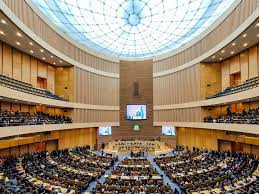
During the 37th African Union Summit, 2024 in Ethiopia, African heads of state unanimously agreed to a historic ban on the trade of donkey skin, thereby prohibiting the killing of donkeys across the continent for their hides.
- This is a significant outcome following the Dar es Salaam declaration adopted at the first African Union-Interafrican Bureau for Animal Resource (AU-IBAR) Pan-African Donkey Conference in December 2022.
- The Dar es Salaam declaration was signed in Tanzania during the Pan African Donkey Skin Conference, organised by the AU-IBAR, where government ministers gathered to understand the harmful effects of the donkey skin trade on animals and communities in Africa.
- It underscores the rapid decrease in Africa’s donkey population and advocates for increased investment in research, policies, and legislation to safeguard the species.
- It advocates for an African Union Commission resolution proposing a 15-year halt on the commercial slaughter of donkeys for their skins, alongside the creation of an African donkey strategy addressing exploitation, production, and productivity, to integrate these concerns into the global development agenda.
- The donkey skin trade, which is largely unregulated, involves cruel practices such as viciously slaughtering donkeys for their skins, which are then exported to China.
- The trade is illegal in some countries and legal in others causing cruelty and suffering to donkeys globally.
- The collagen from the donkey skins is used to create a product known as ejiao (a traditional Chinese medicine) which is then used in food, drink, and beauty products.
Badami Chalukyas : Discovered
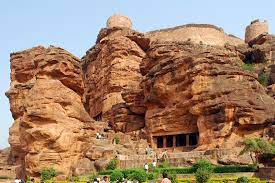
Two Badami Chalukya temples, at least 1,300-1,500 years old and a 1,200-year-old label inscription were recently discovered in Mudimanikyam village along the banks of Krishna.
- The Chalukyas ruled over the central Indian plateau of the Deccan between the sixth and twelfth centuries.
- During that period, they ruled as three closely related but individual dynasties.
- The Chalukyas of Badami, who ruled between the sixth and the eighth centuries, and the two sibling dynasties of the Chalukyas of Kalyani, or the Western Chalukyas, and the Chalukyas of Vengi, or the Eastern Chalukyas.
- Badami Chalukyas Origin:
- Pulakesi I established the Chalukya dynasty in 550.
- Pulakesi I took Vatapi (Badami in Bagalkot district, Karnataka) under his control and made it his capital.
- Historians refer to Pulakesi I and his descendants as the Chalukyas of Badami.
- They ruled over an empire that comprised the entire state of Karnataka and most of Andhra Pradesh in the Deccan.
- Pulakesi II had been perhaps the greatest emperor of the Badami Chalukyas.
- The Badami Chalukya dynasty went into a brief decline following the death of Pulakesi II due to internal feuds.
- It recovered during the reign of Vikramaditya I, who succeeded in pushing the Pallavas out of Badami and restoring order to the empire.
- The empire reached its peak during the rule of the illustrious Vikramaditya II, who defeated Pallava Nandivarman II and captured Kanchipuram.
- The Rashtrakuta Dantidurga overthrew the last Badami Chalukya king, Kirtivarman I, in 753.
Tupolev Tu-160M:
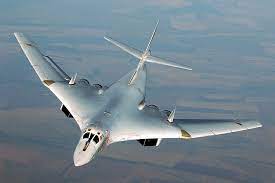
The Russian President recently unveiled the newly modernised Tupolev Tu-160M nuclear-capable strategic bomber at Kazan Aviation Plant.
- Tupolev Tu-160M is a modernised version of a Cold War-era bomber that the former Soviet Union would have deployed in the event of nuclear war to deliver weapons at long distances.
- It is a Russian supersonic variable-sweep wing strategic missile-carrying bomber.
- It is called “White Swan” in Russia and is code-named “Blackjacks” by NATO.
- Russia claims it is the world’s fastest-flying supersonic and heaviest payload-carrying bomber.
- It is designed to hit targets in remote areas with nuclear and conventional weapons.
- The Tu-160M, which has a crew of four, is capable of carrying 12 cruise missiles or 12 short-range nuclear missiles.
- It can fly 12,000 km (7,500 miles) non-stop, without refuelling.
- It is powered by four afterburning turbofan engines.
- It has a maximum speed of 2,220 kilometres per hour and ascends to heights of 16,000 metres.
- It showcases features like an innovative navigation system, an upgraded radar, and even a refuelling probe for in-flight refuelling, which further extends its range.
Exercise Dosti:
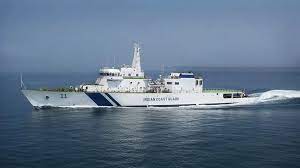
Indian and Sri Lankan coast guard ships reached the Maldives recently to take part in the trilateral coast guard exercise Dosti 16.
- Dosti 16 is the 16th edition of the exercise.
- The Coast Guards of the Maldives, India, and Sri Lanka, along with observers from Bangladesh, are participating in Dosti 16 to enhance collaboration between the forces.
- India is sending ICGS Samarth, ICGS Abhinav, and ICG Dornier for the exercise.
- Exercise Dosti is a trilateral coast guard exercise between India, Sri Lanka, and the Maldives.
- It is a biennial exercise.
- It was first conducted in 1991 between the Indian and Maldives Coast Guards. Sri Lanka joined the exercise for the first time in 2012.
- The exercises have focused on exercises and drills on providing assistance in sea accidents, eliminating sea pollution, and the Coast Guard’s procedures and conduct during situations such as oil spills.
- The aim of the exercise is to further fortify the friendship, enhance mutual operational capability, exercise interoperability and build cooperation between the Coast Guards of India, Sri Lanka, and the Maldives.
Cabinet Committee On Security:
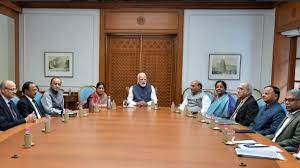
The Cabinet Committee on Security recently cleared the acquisition of over 200 BrahMos extended-range supersonic cruise missiles for deployment on its warships.
- Cabinet Committees are extra-constitutional, meaning, they are not mentioned in the Indian Constitution.
- They are partly designed to reduce the burden on the Union Cabinet by allowing smaller groups of ministers to make decisions on specific policy areas.
- They are constituted or reconstituted when a new government takes over or the Cabinet undergoes a reshuffle.
- The Prime Minister constitutes the Standing Committees of the Cabinet and sets out the specific functions assigned to them.
- The composition of cabinet committees in India can range from three to eight members, which typically consist of only Cabinet Ministers.
- However, non-cabinet ministers may also be appointed as members.
- All cabinet committees are chaired by the prime minister or a senior cabinet minister and will have a number of cabinet ministers as members.
- However, if the Prime Minister is a committee member, he will be the head of the committee.
- The CCS deals with all the issues related to the defence and security of India.
- The CCS deals with all issues related to the law and order of our country and national security.
- It discusses different initiatives to take to enhance the national security of India.
- It also deals with policy matters of foreign affairs which may have a bearing on internal or external security implications, including cases relating to agreements with other countries on security-related issues.
- The Committee discusses the political issues which can impact the security of our nation.
- It reviews the conditions and the manpower of the national security bodies and makes the required changes to increase national security.
- The CCS considers each case that involves a capital expenditure of more than Rs 1,000 crore in respect of the Department of Defence Production and Department of Defence Research and Development.
6th Regional Dialogue Of Secretaries Of Security Councils/National Security Advisers:
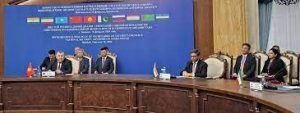
The 6th Regional Dialogue of Secretaries of Security Councils/National Security Advisers (NSA) on Afghanistan was held in Bishkek, Kyrgyzstan.
- India reiterated its collective approach to combating terrorism as stated in the United Nations Security Council Resolution (UNSCR 2593).
- The Regional Security Dialogue on Afghanistan is a series of high-level meetings involving National Security Advisers (NSA) or senior security officials from countries in the region, including Afghanistan, Pakistan, Iran, China, Russia, India, and other Central Asian states.
- These dialogues are platforms for discussing and coordinating regional approaches to address security challenges and promote stability in Afghanistan and the broader region.
- Regional Security Dialogue on Afghanistan follows the objective of UNSCR 2593.
- The resolution, passed by the 15-member organ (UNSC), calls for the prevention of Afghan territory from being used to pose threats or launch attacks against any nation.
- The adoption of the resolution is a strong signal from the Security Council and the international community on its expectations in respect of Afghanistan.
- It underscores the critical necessity of combating terrorism within Afghanistan.




